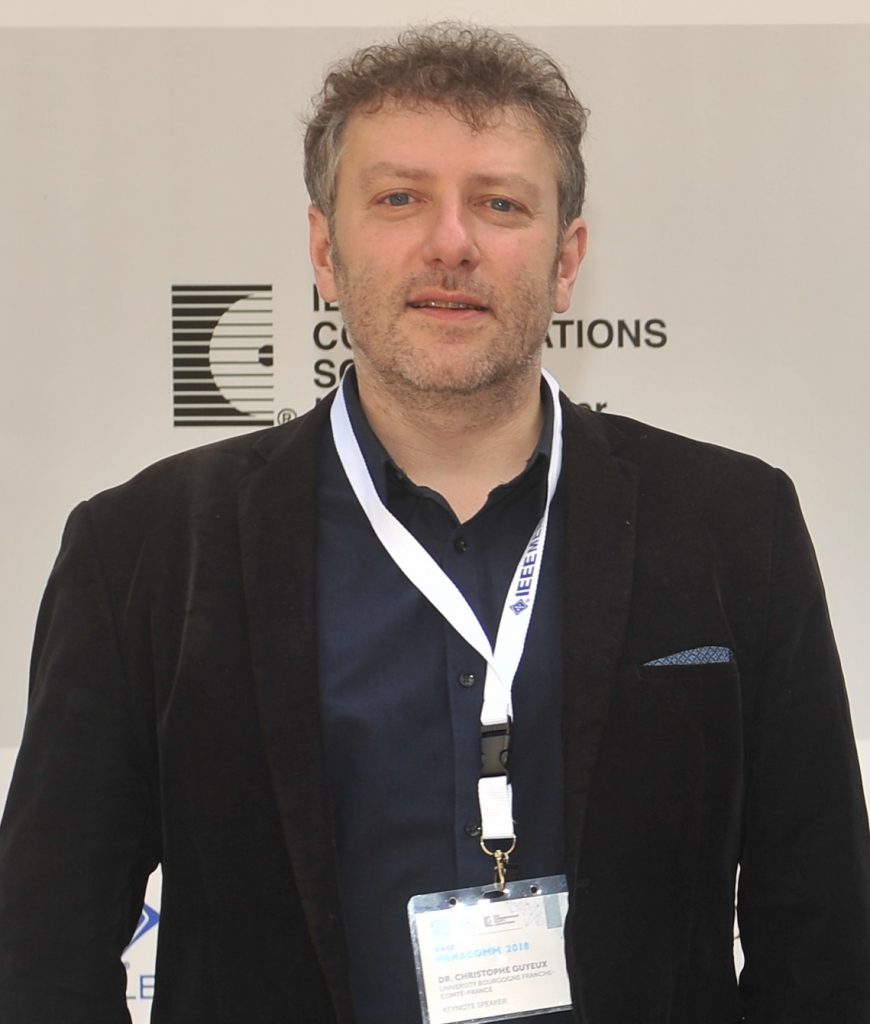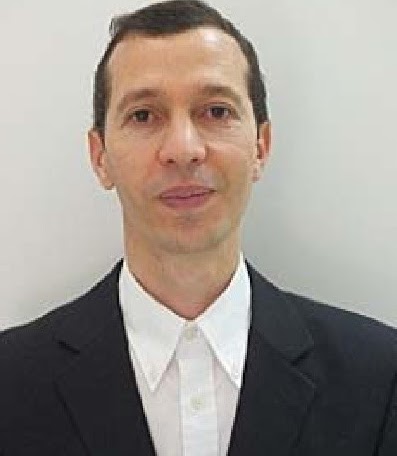Séminaires passés
Le lundi 3 mars dernier, M. Christophe Guyeux et M. Lyes Khoukhi sont venus faire un séminaire au CNAM à 10h et 11h, respectivement.
Voici quelques informations concernant ces séminaires passés.
Orateur : M. Christophe Guyeux (lundi 3 mars 2025 à 10h).

Titre : Un cadre particulier pour des propriétés désirées dans les systèmes contraints : une approche topologique pour l’IoT.
Résumé : Il n’est pas toujours possible de déployer des algorithmes prouvés cryptographiquement sûrs, du moins tels qu’ils devraient l’être rigoureusement, par exemple dans certaines situations sous contraintes où les ressources sont limitées. Des comportements spécifiques de ces systèmes, permettant d’atteindre une certaine sécurité, sont pourtant désirés et recherchés (mélange ou ergodicité, pseudo-aléa, expansivité…), et l’on aimerait pouvoir comparer des algorithmes de la litérature entre eux, à l’aune de ces propriétés et dans ces contextes particuliers. Nous avons développé une approche concrète permettant de fournir un cadre à ces propriétés, rendant possible leur évaluation quand l’approche cryptographique habituelle n’est pas complètement appropriée, tout en restant compatible avec cette dernière.
Dans ce séminaire, nous verrons ce qu’une telle approche héritée des systèmes dynamiques peut apporter, dans des contextes tels que les réseaux sans fil ad hoc. Nous évoquerons par exemple certaines garanties de couverture même en présence de mises en veille, la diffusion d’informations dans le réseau, la transmission réussie d’un noeud quelconque au puits, ou l’insuccès dans des attaques type trou noir ou par suppression de noeuds…
A propos : Christophe Guyeux est professeur au laboratoire FEMTO-ST, Département Informatique des Systèmes Complexes à l’Université Marie et Louis Pasteur (ex. Univ. de Franche-Comté) depuis 2014. Ses travaux portent principalement sur la sécurité informatique, l’intelligence artificielle et les réseaux de capteurs, avec une approche souvent interdisciplinaire. Ses recherches tendent à l’utilité pratique, se concrétisant notamment dans la direction d’un interreg sur l’IoT pour les sapeurs-pompiers, et d’un laboratoire commun public-privé (ANR LabCom) pour l’industrialisation de solutions à base d’IA pour la sécurité civile et la santé.
Orateur : M. Lyes Khoukhi (lundi 3 mars 2025 à 11h).

Titre : New vision of trust in connected networks: secure behavioral models.
Résumé : Dealing with trust challenges in connected networks remains as one of the serious security hot topics because of the new nature of attacks. Recently, there has been a huge increase in the number of threats and cyber attacks on critical connected networks/infrastructures (like V2X, IoT and 5G, Cloud, and Smart grids); these attacks continue to grow at a rapid rate and cause huge damage at both end-users and data/network operators sides. Several efforts have been conducted by both industry and academia to propose countermeasures solutions, but some of them still suffering from either non scalability or limitive risks hypotheses.
In this seminar, we present a new vision of trust in connected networks by presenting a set of behavioral-based models to mitigate attacks in connected networks showing the need to cope with the new emerging threats, ranging from data leakage to collaborative attacks. Our models are not limited by the need of new attack patterns/signatures (to prevent them to fall within zero-day threat). We also present the future vision of securing connected networks while respecting the standards requirements.
A propos : Lyes Khoukhi is Full Professor of cybersecurity at ENSICAEN (with CNRS GREYC UMR laboratory), Caen, France. He received his Ph.D. degree in computer engineering from the University of Sherbrooke, Canada, in 2006. Between 2007 and 2008, he was a researcher with the Department of Computer Science and Operations Research, University of Montreal in collaboration with Bell-Canada. In 2008, he also worked for Dialexia Corporation-Montreal, in the development of safe communications solutions. In 2009, he joined UTT -University of Technology of Troyes- as assistant professor, where he became Full professor at 2018. Since 2020, he joined, as Full professor, ENSICAEN, Normandie University where he is involved in several responsabilities and collective works. His research interests include conception of defense lines, prediction and attacks detection, malicious behaviors modeling and privacy preserving. His target areas are IoT, V2X, MEC, and 5G/6G. He has participated as a General chair or program chair for many conferences (like IEEE LCN, IEEE ICC Symposiums). He is the Guest Editor of special issues, like Springer journal of Annals of Telecommunications of the SI (Internet of Vehicles & Smart City)-2020, about security and protocols issues in V2X. He is also the SIG leader of « Machine Learning for IoT and ad hoc networks » of the IoT ASHN ComSoc Committee of IEEE Communications Society.
Séminaire du laboratoire
Tous les 3 mois environ une des 8 équipes du laboratoire prend en charge une session du séminaire du laboratoire, sous la forme d’un exposé de vulgarisation en lien avec les thématiques de l’équipe.
Le prochain séminaire du laboratoire CEDRIC aura lieu le mercredi 28 mai prochain à partir de 14h, dans l’amphithéâtre Laussédat (31.3.30). Il sera organisé par l’équipe OC, et les deux orateurs seront Christophe Picouleau et Dimitri Watel.
Titre : De la reconstruction de graphes et hypergraphes.
Résumé : De nombreux problèmes consistent à vouloir reconstruire une structure, ici un graphe ou un hypergraphe, à partir d’une information partielle concernant cette structure. Parmi ces informations citons de manière non exhaustive : des projections de matrices d’adjacentes, des séquences de degrés, la structure complète ou non des voisinages de sommets ou d’arêtes. On peut voir cette information partielle comme une requête sur le graphe, ou comme une connaissance imparfaite car vue à travers une transformation du graphe. Nous allons monter deux exemples caractéristiques de tels problèmes.
Le premier consiste, connaissant une information partielle provenant d’un (hyper)graphe, à déterminer s’il existe au moins deux (hyper)graphes qui peuvent correspondre à ces informations. Par exemple, deux graphes k-réguliers de même taille donneront la même séquence des degrés, il n’y a donc pas unicité dans ce cas. On dit qu’il ne sont pas reconstructibles de manière unique par la requête « séquence des degrés ». La reconstruction de manière unique est importante car elle assure que l’information, même partielle, est suffisante pour reconstruire tout le graphe sans ambiguïté. La présentation se concentrera sur un type de requête bien particulier: pour chaque triplet de sommets d’un graphe, nous savons si un des trois est relié aux deux autres, mais que ces deux autres ne sont pas reliés. Autrement dit, ces 3 sommets forment une chaîne. Nous expliquerons les idées clefs permettant de déduire les graphes reconstructibles de manière unique pour cette requête.
Le second consiste, connaissant une information partielle, à déterminer s’il existe au moins un (hyper)graphe qui correspond à ces informations. Etant donné un hypergraphe le graphe d’intersection de ses hyperarêtes a pour ensemble sommets les hyperarêtes et deux sommets sont reliés si les deux hyperarêtes s’intersectent. Ceci généralise la notion de line-graphe pour le cas des graphes simples. Le problème de reconstruction associé consiste alors, étant donné un graphe décider s’il peut-être le graphe d’intersection d’un hypergraphe. Pour le cas de line-graphes le problème est bien résolution, à la fois structurellement et algorithmiquement. Il en va tout autrement pour les hypergraphes même dans le cas d’hypergraphes 3-uniformes (chaque hyperarête contient 3 sommets). Nous donnerons quelques résultats de nature algorithmique pour les graphes de 2-intersection (intersection par au moins 2 sommets) d’hypergraphes 3-uniformes.
Anciens séminaires
Le vendredi 7 mars 2025, une session du séminaire du laboratoire CEDRIC a eu lieu de 14h à 17h. Elle a été organisée par l’équipe ROC, et nous avons accueilli Sara Tucci, directrice du CEA List, dans l’amphithéâtre Robert Faure (Z) du CNAM.

Title: Understanding the Ethereum’s Proof-of-Stake Protocol.
Abstract: Ethereum’s recent upgrade, known as the Merge, transitioned the blockchain to a Proof-of-Stake model, introducing an original consensus protocol that combines elements of both Nakamoto-style and Byzantine Fault Tolerance designs. This shift led to a complex protocol that, at the time of implementation, was only partially documented. In this talk, I will present our analysis of Ethereum’s Proof-of-Stake protocol, examining its safety, liveness, and incentive compatibility across various network models. Our findings reveal that, in an eventually synchronous network without participant churn, Ethereum’s Proof-of-Stake protocol ensures safety but achieves only probabilistic liveness. Moreover, with the inclusion of the Inactivity Leak mechanism—which removes inactive validators—we identified potential safety vulnerabilities. Finally, we demonstrate that the protocol ensures incentive compatibility in a synchronous setting and achieves eventual incentive compatibility in an eventually synchronous environment.
Son exposé a été suivi par un exposé de Billel Hakem, doctorant dans l’équipe ROC.
Title: Synthetic data generation for predictive maintenance.
Abstract: Predictive maintenance aim at detecting anomalies and predictive the remaining useful life of industrial systems using sensor data and deep learning algorithms. Due to concern of data privacy and data scarcity, there’s a need to explore alternate alternative to acquire enough data for predictive maintenance systems. We propose a physical simulation for data generation and a test on a diagnosis and prognosis task.
Il y a également eu une session de « brainstorming », et une session de posters.
